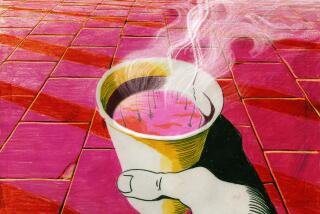$50 for a cup of coffee? All you need is elephant poop
- Share via
Starbucks raised eyebrows when it recently started offering coffee for $7 a cup. But that’s nothing compared to a brew that goes for a hefty $50 per serving.
Why does this coffee cost so much? Because the beans first have to be eaten, digested and then pooped out by an elephant.
Apparently that’s an exotic enough process to fetch a price of $500 a pound, making this one of the world’s most expensive blends.
The coffee is called Black Ivory and hails from Thailand. It was unveiled last month at a handful of luxury hotels catering to, well, the sort of people who can afford a $50 cup of joe.
“When an elephant eats coffee, its stomach acid breaks down the protein found in coffee, which is a key factor in bitterness,” Blake Dinkin, who has spent $300,000 developing the coffee, told the Associated Press. “You end up with a cup that’s very smooth without the bitterness of regular coffee.”
This isn’t the first coffee that relies on poops for its heady flavor. Kopi luwak employs civets for a similar purpose. But apparently the larger stomachs of elephants add to the mix.
It can take between 15 and 30 hours for an elephant to digest coffee beans. That means they have plenty of time to stew alongside all the bananas, sugar cane and other stuff a pachyderm might have chomped on during the interval.
This might make for an unusually zesty brew, but let’s be realistic: There are a lot better things you can do with $50 than buy a single cup of coffee.
For instance, you could buy seven of Starbucks’ top blend. You might miss out on all the bananas and sugar cane. But at least you’d get a whole week of your fix instead of just a day’s worth.
ALSO:
Starbucks pushes hard into tea with $620-million Teavana buy
Starbucks: 3,000 new stores in Americas by 2017 (or two a day)
More to Read
Inside the business of entertainment
The Wide Shot brings you news, analysis and insights on everything from streaming wars to production — and what it all means for the future.
You may occasionally receive promotional content from the Los Angeles Times.











